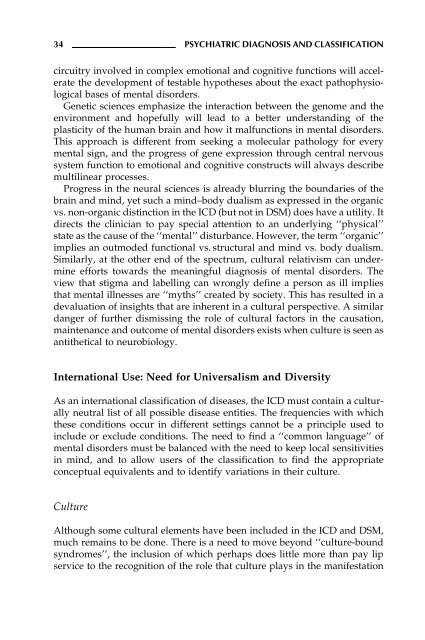Psychiatric Diagnosis and Classification - ResearchGate
Psychiatric Diagnosis and Classification - ResearchGate
Psychiatric Diagnosis and Classification - ResearchGate
Create successful ePaper yourself
Turn your PDF publications into a flip-book with our unique Google optimized e-Paper software.
34 PSYCHIATRIC DIAGNOSIS AND CLASSIFICATION<br />
circuitryinvolved in complex emotional <strong>and</strong> cognitive functions will accelerate<br />
the development of testable hypotheses about the exact pathophysiological<br />
bases of mental disorders.<br />
Genetic sciences emphasize the interaction between the genome <strong>and</strong> the<br />
environment <strong>and</strong> hopefullywill lead to a better underst<strong>and</strong>ing of the<br />
plasticityof the human brain <strong>and</strong> how it malfunctions in mental disorders.<br />
This approach is different from seeking a molecular pathologyfor every<br />
mental sign, <strong>and</strong> the progress of gene expression through central nervous<br />
system function to emotional <strong>and</strong> cognitive constructs will always describe<br />
multilinear processes.<br />
Progress in the neural sciences is alreadyblurring the boundaries of the<br />
brain <strong>and</strong> mind, yet such a mind±body dualism as expressed in the organic<br />
vs. non-organic distinction in the ICD but not in DSM) does have a utility. It<br />
directs the clinician to payspecial attention to an underlying ``physical''<br />
state as the cause of the ``mental'' disturbance. However, the term ``organic''<br />
implies an outmoded functional vs. structural <strong>and</strong> mind vs. bodydualism.<br />
Similarly, at the other end of the spectrum, cultural relativism can undermine<br />
efforts towards the meaningful diagnosis of mental disorders. The<br />
view that stigma <strong>and</strong> labelling can wronglydefine a person as ill implies<br />
that mental illnesses are ``myths'' created by society. This has resulted in a<br />
devaluation of insights that are inherent in a cultural perspective. A similar<br />
danger of further dismissing the role of cultural factors in the causation,<br />
maintenance <strong>and</strong> outcome of mental disorders exists when culture is seen as<br />
antithetical to neurobiology.<br />
International Use: Need for Universalism <strong>and</strong> Diversity<br />
As an international classification of diseases, the ICD must contain a culturallyneutral<br />
list of all possible disease entities. The frequencies with which<br />
these conditions occur in different settings cannot be a principle used to<br />
include or exclude conditions. The need to find a ``common language'' of<br />
mental disorders must be balanced with the need to keep local sensitivities<br />
in mind, <strong>and</strong> to allow users of the classification to find the appropriate<br />
conceptual equivalents <strong>and</strong> to identifyvariations in their culture.<br />
Culture<br />
Although some cultural elements have been included in the ICD <strong>and</strong> DSM,<br />
much remains to be done. There is a need to move beyond ``culture-bound<br />
syndromes'', the inclusion of which perhaps does little more than pay lip<br />
service to the recognition of the role that culture plays in the manifestation

















